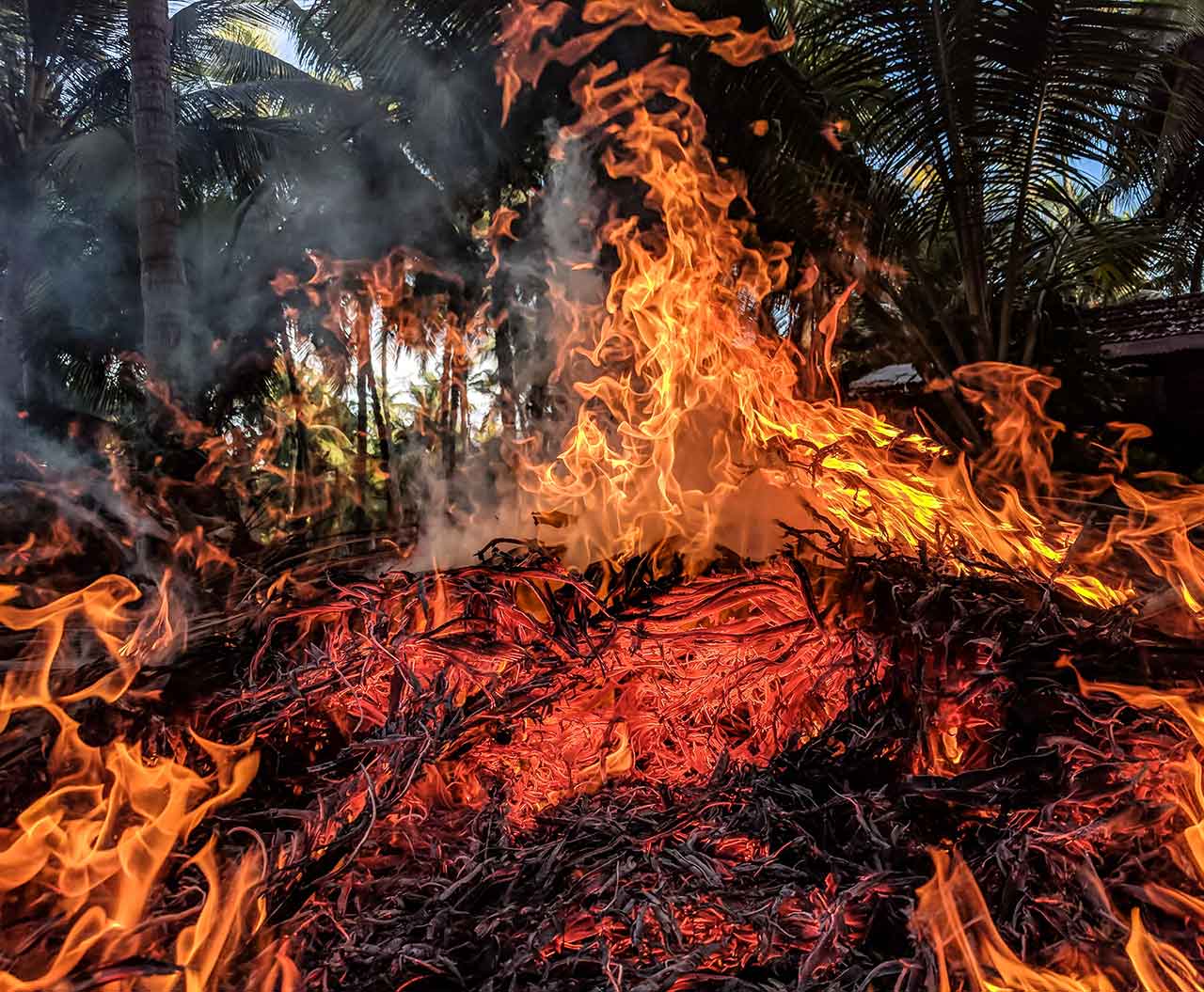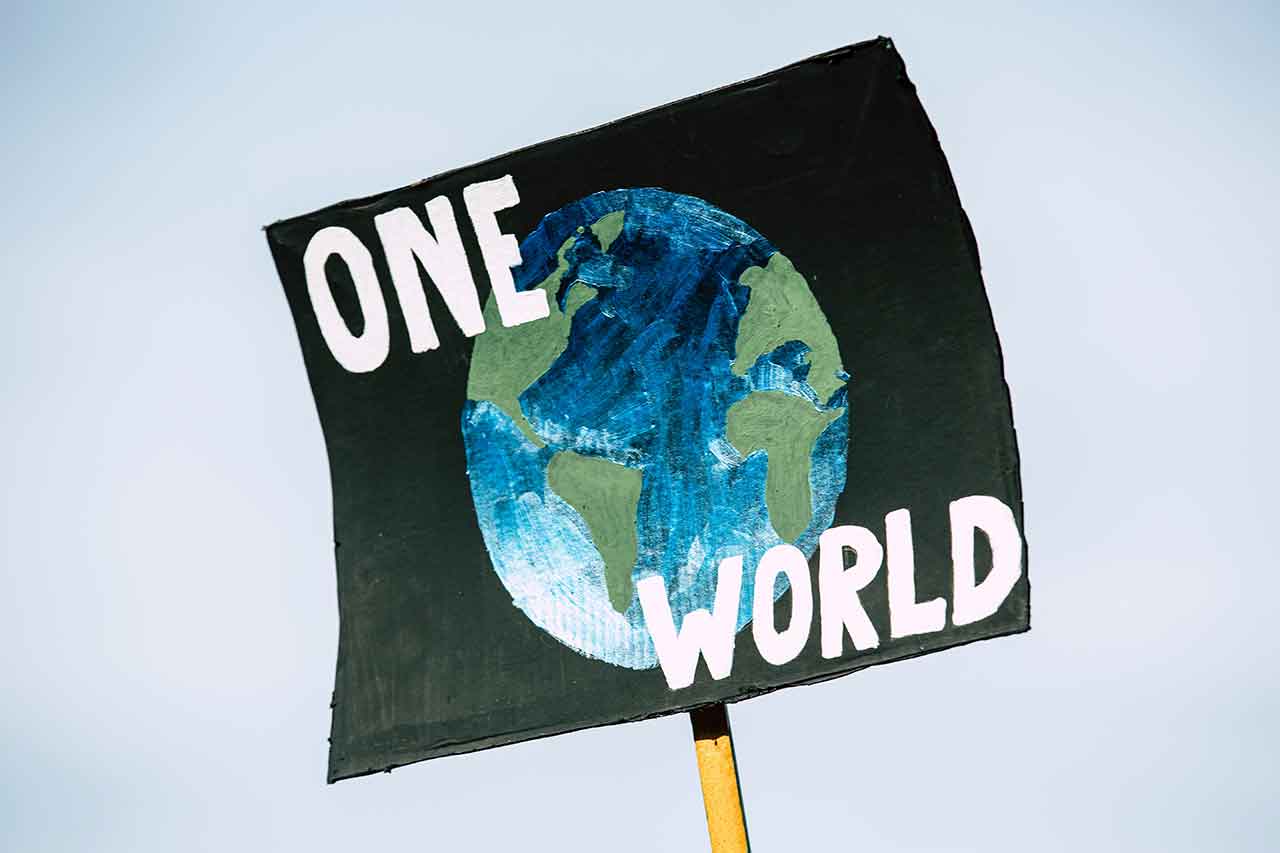The hopelessness that comes from feeling overburdened by the implications of climate change and being concerned about the environmental problems caused leads us to consider ourselves as weak, inconsequential people on the earth incapable of reversing the situation. Another sense of worthlessness also arises that no amount of effort will ever be sufficient.
You are aware that the changing environment impacts your or your child’s health, but you are unsure how to prevent it. Feeling impotent in the face of approaching calamity raises stress and anxiety, and the American Psychological Association coined the term “eco-anxiety” to describe this condition in 2017. (1)
You are not alone if you feel this way. Given the magnitude of the challenges, it is fair to be concerned about the ecological problems we are facing. Eco-anxiety is quite widespread.
Eco-anxiety can emerge from an increasing knowledge of the possibility of catastrophic weather occurrences, loss of livelihood or shelter, concerns for coming generations, and a sense of powerlessness. Media coverage on environmental and climate issues to spread awareness among the masses and human initiatives on an individual level to mitigate them can elicit a response and might bring a change.
Eco-anxiety will not go away in this age of ecological reckoning. That implies we will have to learn to deal with it, but we have to know more about it before that.
What is eco-anxiety?
If you are seriously concerned about the consequences of climate change, a worldwide environmental disaster, or a particular incident related to a weather downturn, and if these anxious thoughts and fears are either consistent or temporary overwhelming, causing insomnia, panic attacks, or a loss of concentration in relationships or school activities, the chances are that you are struggling with eco-anxiety.
Eco-anxiety is often accompanied by guilt about the environmental implications of most of your acts and a deep sense of hopelessness that there is nothing you can do, which leaves you helpless.
Statistics of eco-anxiety have increased steadily worldwide in the last few years, particularly as the impact of global warming and its environmental impacts has become more frequently published in the media to raise public awareness of the issue. However, this has had several negative consequences, and eco-anxiety is one of them.
Anxiety over the environment can also be linked to one or more specific ecological disasters that happen near to home. Although eco-anxiety is not a medical diagnosis, general anxiety is, and eco-anxiety has most of similar symptoms. Aside from eco-anxiety, most individuals are concerned about the environment, while some are more concerned than others; this is why eco-psychology, which examines our psychological interaction with the natural environment, is gaining popularity. (2)

Is it rational?
Everyone has anxiety at times, and some individuals are more apprehensive than others about certain issues. Anxiety is a natural, sensible reaction to situations in our surroundings that risk our health or security or are particularly unsafe. (3)
Anxiety is sometimes considered to be a positive reaction as it alerts us from unfavorable situations ahead of time. (4) When we keep in view today’s environmental and climate issues, eco-anxiety is understandable, as these issues pose a danger to our wellbeing. Indeed, it would be absurd not to be bothered about these difficulties as a responsible citizen should.
Some individuals believe that humans are an intrinsic part of the global ecosystem. Hence, environmental challenges are direct threats to every individual’s wellbeing because we are ecosystem inhabitants. Anxiety may be a driving factor, prompting us to take action against potential dangers. (5)
Is eco-anxiety clinical anxiety?
Doctors do not recognize eco-anxiety as a diagnosable disorder because it is not currently recognized in the Diagnostic and Statistical Manual of Mental Disorders (DSM-5). However, mental health professionals use the term eco-anxiety in the field of ecopsychology, which studies people’s psychological relationships with the rest of nature and how this impacts their personality and health.
Eco-anxiety cannot be diagnosed under the umbrella of clinical anxiety since it is not formally recognized as a medical or mental disorder. People are impacted differently by environmental anxiety, with some people being more influenced than others. It cannot be labeled a disorder since eco-anxiety is normal and understandable at acceptable levels. However, it can be debilitating and persistent at times resulting in high-functioning anxiety (6), and it can also interact with and aggravate other serious illnesses.
Eco-anxiety vs. Generalized Anxiety Disorder (GAD)
Eco-anxiety differs from other sorts of anxiety in that it is a reasonable concern that does not require medical therapy. Generalized Anxiety Disorder (GAD) is a mental condition in which a person is frequently disturbed or anxious about various things and finds it difficult to manage this anxiety. (7) GAD is caused by a brain impulse disruption that detects danger and prompts avoidance behaviors. (8)
When GAD is active, danger signals might be felt even when there is no risk.
If the symptoms of eco-anxiety start to resemble those of GAD, or if eco-anxiety interferes with everyday activities, one should consult a doctor.
Cognitive Behavioral Therapy is a simple recommended treatment that is also advised for GAD. (9) Thoughts and attitudes regarding climate change and the environment are examined in CBT for eco-anxiety, and personal coping mechanisms are established. However, this would be distinct from other sorts of anxiety treatment in that it would acknowledge that eco-anxiety is genuine and reasonable. (10)
Are eco-anxiety and ecological grief the same?
Eco-anxiety and ecological grief is not the same thing. Eco-anxiety can still motivate us to take action, and initiative may even be a solution for it. However, ecological grief is a journey of admitting that something has passed us by, and we must develop other paths.
Ecological grief is characterized by a sense of bereavement and regret for the existing and potential loss of the environment and the effects of climate change. It demonstrates an acceptable level of the fact that such losses are unavoidable. (11)
This term emphasizes that what is done can not be retrieved and that we are coming to grips with the loss by stressing sadness and sorrow. It denotes a phase in which we become less nervous and more at ease with ourselves. (12)
Stages of Ecological Grief
Ecological grieving is supposed to proceed through the following five phases: (13)
1. Denial:
The denial stage involves claiming that it can not be real and that other elements are at the action.
2. Anger:
This stage is accompanied by rage and regret as one wonders why no one saw this was coming earlier, identifying the perpetrators, stressing the reasons, and blaming the responsible people.
3. Bargaining:
Optimism and proactive improvement plans characterize this phase. It entails seeking solutions, expecting to change the situation, and encouraging others to take measures.
4. Depression:
This phase begins when one feels helpless and discouraged, realizes that their activity is not working, internalizes worries, and cannot find a solution.
5. Acceptance:
Acceptance is the ultimate step when a person recognizes that crying over spilled milk is pointless and that instead, they should think about what went wrong and how to avoid it in the future. It entails embracing the reality of loss and devising a new strategy for moving forward with limited or altered resources.
In these five stages of ecological grief, combative action is not stressed. There is no reason to believe that someone grieving should be suffering anxiety or that someone struggling with anxiety should be grieving.
Each of us has the right to experience and respond to environmental difficulties in our distinct ways. Both eco-anxiety and ecological grief are reasonable reactions to the world’s present environmental and climate problems. (14)

Causes of eco-anxiety
Climate change is a worldwide issue, but it also affects individuals. Even if you do not consider thinking about your link to the earth, it exists for everyone.
Anxiety over ecological issues can originate from personal experience with, or being in danger of, climate-related extreme events, such as hurricanes, floods, and wildfires, or from having loved ones in such situations. Environmental degradation is often covered in the media, and proof of humans’ harmful influence on the environment is growing.
Here are some of the major variables that contribute to eco-anxiety.
Experiencing negative impacts of climate change
It is one thing to hear about climate change’s long-term consequences; however, witnessing them by self is far more influential. (15)
Gradual impacts, such as excessive heat and increasing rainfall, may go unnoticed at first, but do not underestimate their impact. High temperatures can still impact you by raising tension and irritability and posing a risk to individuals using psychiatric drugs that impair body temperature control. (16)
Furthermore, more rain implies less sunlight. Sunlight supports the production of serotonin, a hormone linked to decreased anxiety and depression and improved general health. You are more likely to have mood-related symptoms, such as seasonal depression if you do not get enough sunshine. (17)
Extensive news coverage
Although more media coverage of climate change is a positive indicator, more knowledge may lead to more individuals taking action.
However, scrolling and the inability to avoid climate change news may not necessarily bring a positive change.
The constant flood of news about dwindling rainforests, coral reef degradation, and species decreasing to a few dozen might exacerbate your outrage and anguish. In certain circumstances, overwhelming depression might make it impossible to initiate any action at all.
Being regretful for your actions
It is natural to be tough on oneself to use plastic or use your air conditioner more often and other such activities that contribute to climate change. This awareness of one’s own behaviors is essential, but it may also be harmful to one’s mental health.
Feeling guilty and remorseful for your actions may coexist with feelings of helplessness, fueled by the fact that you only have so much time to make a difference. While you may take actions to lessen your detrimental environmental impact, no one person can address climate change independently. It is a massive concern that necessitates a worldwide commitment to radical change, and this sense of helplessness can contribute to eco-anxiety.
People are beginning to experience chronic anxiety and depression as a result of their belief that they cannot address these environmental concerns, particularly climate change.

Symptoms of eco-anxiety
Environmental anxiety does not impact everyone in the same way. It is more common among those who are concerned about environmental conservation. Anxiety, agitation, irregular sleep, nervousness, and other minor symptoms can occur in eco-anxiety.
Eco-anxiety can lead to a feeling of suffocation or even high-functioning depression in the most severe situations. People going through the latter group are more likely to feel a powerful sense of remorse about the state of the earth, which can be exacerbated when pondering about the future of their family.
Moral outrage or frustration, especially toward those who deny global warming or older people for not progressing faster, is common with eco-anxiety.
Some other potential symptoms may include pessimistic thinking, existential depression, post-traumatic stress after suffering from the consequences of climate change (18), despair and grief over the degradation of natural environments or wildlife populations, and intrusive thoughts about the climate.
Friendships, sexual connections, and familial interactions may be disturbed due to stress, especially when people surrounding you are not conscious about the environment and climate changes like you.
Sometimes these concerns about ecological changes get so overwhelming that people seek distractions to help them feel better. Distracting yourself may not be beneficial if it keeps you from processing your feelings or incorporates coping techniques like substance abuse or excessive drinking.
Who is more prone to eco-anxiety?
Since everyone relies on the planet’s vitality, eco-anxiety can impact anyone. However, certain populations are more vulnerable to climate change and face a larger risk of suffering from its effects.
Individuals living in coastal or island regions, arid areas, or other geologically susceptible locations, socioeconomically deprived groups, or people with impairments or chronic health complications are among the most vulnerable groups prone to eco-anxiety.
Families that are financially not stable may find it more difficult to cope with the effects of a natural catastrophe, which is likely to exacerbate sadness and distress.
Indigenous communities whose lives are influenced by sea ice and other shifting climates risk losing their way of life and their sociocultural identities.
Fishing, hunting, and agricultural communities risk losing their land, income, and way of life. Long periods of drought are linked to greater suicide rates among farmers (19), illustrating only one of the catastrophic consequences of eco-anxiety among these reliant on nature groups.
Furthermore, many groups at the greatest risk face greater hurdles to medical and mental health care. Since they do not have access, they can not get the help they need to deal with eco-anxiety.
How to manage and cope with eco-anxiety?
We can reduce the consequences of eco-anxiety in the same way that any other anxiety-related condition can be reduced by somehow searching for the bright side of any situation, focusing on emotional control in the face of one’s inclinations, developing strength in the face of adversity, and so on. Another important component in reducing guilt is contributing to environmental protection by encouraging a sustainable and balanced lifestyle.
We are by no means alone in this. The important challenge now is how we can treat eco-anxiety such that it does not negatively impact our mental health. Climate scientists and mental health specialists have both suggested strategies for effectively coping with climate emotions, and they may be easier than you think.
Climate change is a frightening prospect. It is natural to desire to prevent eco-anxiety by completely shutting off the topic. It will not make you feel any better, though, because suppressing negative sensations usually makes them worse.
Allow yourself to fully accept your sentiments rather than rejecting the truth of climate change. If you are feeling guilty about previous actions that were not environmentally friendly, forgive yourself and resolve to make better choices in the future.
Living in line with your unique principles may help you grow your sense of individuality; thus, embracing greener and more sustainable lifestyle habits can frequently make a difference in your attitude.
Analyze your carbon footprint to identify solutions to lessen your negative influence on the environment. Physical commuting, such as bicycling or walking, is preferable to driving since it improves your physical and mental health while lowering carbon emissions.
Reaching out to community organizations fighting to address climate change can help you get involved in larger initiatives.
It is also not necessary to take concentrated activity to reduce anxious feelings. Anxiety levels and general mental health can be influenced by how and where you spend your leisure time. Consuming more time in green areas and nature has been proven to reduce stress levels and stress-related disease rates.
These habits will keep you healthy while contributing positively to the ecosystem and increasing your self-esteem.

Conclusion
Climate change-related anxiety may appear to be less significant than the actual, real harm that many people are now experiencing throughout the world.
At present, eco-anxiety is not a recognized medical condition. As defined by mental health specialists, environmental dread is a persistent sensation of impending doom, frequently based on emotions of impotence in the face of environmental degradation.
However, it is critical to pay attention to them rather than filter out these sensations. There is just one planet available to us. We will not be able to leave it since we do not have a route out; therefore, we will have to fight for it instead.
We can alleviate this anxiety by employing coping techniques or seeking professional treatment, particularly from a climate psychologist.

